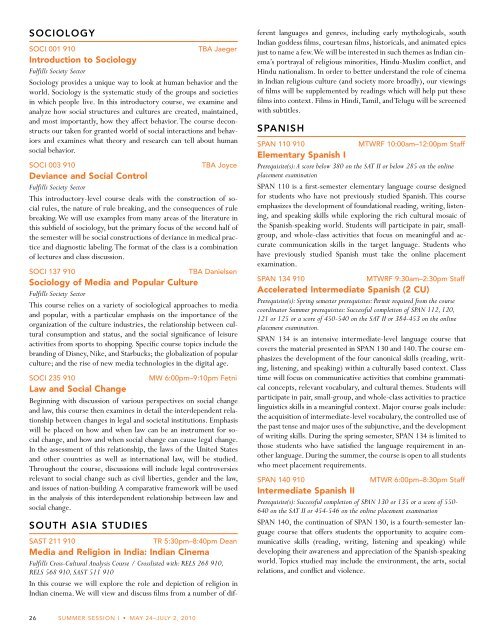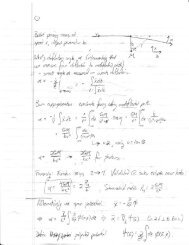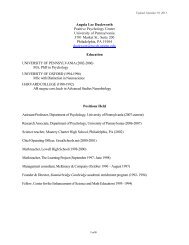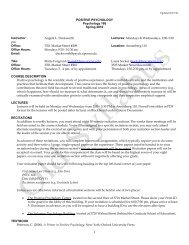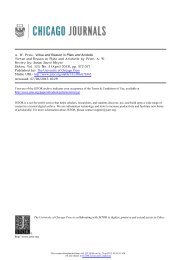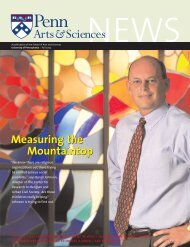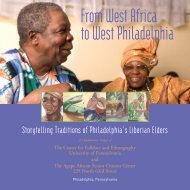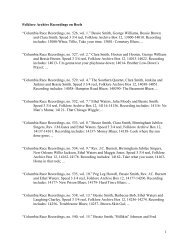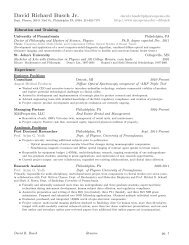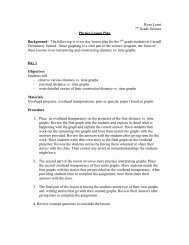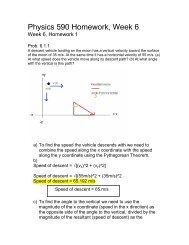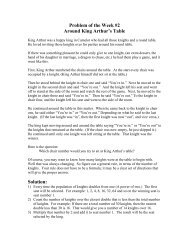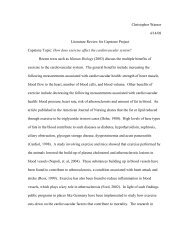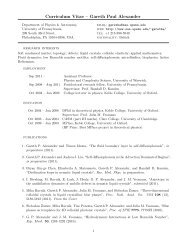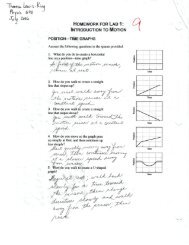PENN SUMMER - University of Pennsylvania
PENN SUMMER - University of Pennsylvania
PENN SUMMER - University of Pennsylvania
You also want an ePaper? Increase the reach of your titles
YUMPU automatically turns print PDFs into web optimized ePapers that Google loves.
SoCioloGY<br />
soCI 001 910 TBa Jaeger<br />
Introduction to Sociology<br />
Fulfills Society Sector<br />
Sociology provides a unique way to look at human behavior and the<br />
world. Sociology is the systematic study <strong>of</strong> the groups and societies<br />
in which people live. In this introductory course, we examine and<br />
analyze how social structures and cultures are created, maintained,<br />
and most importantly, how they affect behavior. The course deconstructs<br />
our taken for granted world <strong>of</strong> social interactions and behaviors<br />
and examines what theory and research can tell about human<br />
social behavior.<br />
soCI 003 910 TBa Joyce<br />
Deviance and Social Control<br />
Fulfills Society Sector<br />
This introductory-level course deals with the construction <strong>of</strong> social<br />
rules, the nature <strong>of</strong> rule breaking, and the consequences <strong>of</strong> rule<br />
breaking. We will use examples from many areas <strong>of</strong> the literature in<br />
this subfield <strong>of</strong> sociology, but the primary focus <strong>of</strong> the second half <strong>of</strong><br />
the semester will be social constructions <strong>of</strong> deviance in medical practice<br />
and diagnostic labeling. The format <strong>of</strong> the class is a combination<br />
<strong>of</strong> lectures and class discussion.<br />
soCI 137 910 TBa danielsen<br />
Sociology <strong>of</strong> Media and Popular Culture<br />
Fulfills Society Sector<br />
This course relies on a variety <strong>of</strong> sociological approaches to media<br />
and popular, with a particular emphasis on the importance <strong>of</strong> the<br />
organization <strong>of</strong> the culture industries, the relationship between cultural<br />
consumption and status, and the social significance <strong>of</strong> leisure<br />
activities from sports to shopping. Specific course topics include the<br />
branding <strong>of</strong> Disney, Nike, and Starbucks; the globalization <strong>of</strong> popular<br />
culture; and the rise <strong>of</strong> new media technologies in the digital age.<br />
soCI 235 910 MW 6:00pm–9:10pm Fetni<br />
Law and Social Change<br />
Beginning with discussion <strong>of</strong> various perspectives on social change<br />
and law, this course then examines in detail the interdependent relationship<br />
between changes in legal and societal institutions. Emphasis<br />
will be placed on how and when law can be an instrument for social<br />
change, and how and when social change can cause legal change.<br />
In the assessment <strong>of</strong> this relationship, the laws <strong>of</strong> the United States<br />
and other countries as well as international law, will be studied.<br />
Throughout the course, discussions will include legal controversies<br />
relevant to social change such as civil liberties, gender and the law,<br />
and issues <strong>of</strong> nation-building. A comparative framework will be used<br />
in the analysis <strong>of</strong> this interdependent relationship between law and<br />
social change.<br />
SoUTh aSia STUDieS<br />
sasT 211 910 Tr 5:30pm–8:40pm dean<br />
Media and Religion in India: Indian Cinema<br />
Fulfills Cross-Cultural Analysis Course / Crosslisted with: RELS 268 910,<br />
RELS 568 910, SAST 511 910<br />
In this course we will explore the role and depiction <strong>of</strong> religion in<br />
Indian cinema. We will view and discuss films from a number <strong>of</strong> dif-<br />
26 <strong>SUMMER</strong> SESSIOn I • MAY 24–JULY 2, 2010<br />
ferent languages and genres, including early mythologicals, south<br />
Indian goddess films, courtesan films, historicals, and animated epics<br />
just to name a few. We will be interested in such themes as Indian cinema’s<br />
portrayal <strong>of</strong> religious minorities, Hindu-Muslim conflict, and<br />
Hindu nationalism. In order to better understand the role <strong>of</strong> cinema<br />
in Indian religious culture (and society more broadly), our viewings<br />
<strong>of</strong> films will be supplemented by readings which will help put these<br />
films into context. Films in Hindi, Tamil, and Telugu will be screened<br />
with subtitles.<br />
SPaniSh<br />
sPan 110 910 MTWrF 10:00am–12:00pm staff<br />
Elementary Spanish I<br />
Prerequisite(s): A score below 380 on the SAT II or below 285 on the online<br />
placement examination<br />
SPAN 110 is a first-semester elementary language course designed<br />
for students who have not previously studied Spanish. This course<br />
emphasizes the development <strong>of</strong> foundational reading, writing, listening,<br />
and speaking skills while exploring the rich cultural mosaic <strong>of</strong><br />
the Spanish-speaking world. Students will participate in pair, smallgroup,<br />
and whole-class activities that focus on meaningful and accurate<br />
communication skills in the target language. Students who<br />
have previously studied Spanish must take the online placement<br />
examination.<br />
sPan 134 910 MTWrF 9:30am–2:30pm staff<br />
Accelerated Intermediate Spanish (2 CU)<br />
Prerequisite(s): Spring semester prerequisites: Permit required from the course<br />
coordinator Summer prerequisites: Successful completion <strong>of</strong> SPAN 112, 120,<br />
121 or 125 or a score <strong>of</strong> 450-540 on the SAT II or 384-453 on the online<br />
placement examination.<br />
SPAN 134 is an intensive intermediate-level language course that<br />
covers the material presented in SPAN 130 and 140. The course emphasizes<br />
the development <strong>of</strong> the four canonical skills (reading, writing,<br />
listening, and speaking) within a culturally based context. Class<br />
time will focus on communicative activities that combine grammatical<br />
concepts, relevant vocabulary, and cultural themes. Students will<br />
participate in pair, small-group, and whole-class activities to practice<br />
linguistics skills in a meaningful context. Major course goals include:<br />
the acquisition <strong>of</strong> intermediate-level vocabulary, the controlled use <strong>of</strong><br />
the past tense and major uses <strong>of</strong> the subjunctive, and the development<br />
<strong>of</strong> writing skills. During the spring semester, SPAN 134 is limited to<br />
those students who have satisfied the language requirement in another<br />
language. During the summer, the course is open to all students<br />
who meet placement requirements.<br />
sPan 140 910 MTWr 6:00pm–8:30pm staff<br />
Intermediate Spanish II<br />
Prerequisite(s): Successful completion <strong>of</strong> SPAN 130 or 135 or a score <strong>of</strong> 550-<br />
640 on the SAT II or 454-546 on the online placement examination<br />
SPAN 140, the continuation <strong>of</strong> SPAN 130, is a fourth-semester language<br />
course that <strong>of</strong>fers students the opportunity to acquire communicative<br />
skills (reading, writing, listening and speaking) while<br />
developing their awareness and appreciation <strong>of</strong> the Spanish-speaking<br />
world. Topics studied may include the environment, the arts, social<br />
relations, and conflict and violence.


